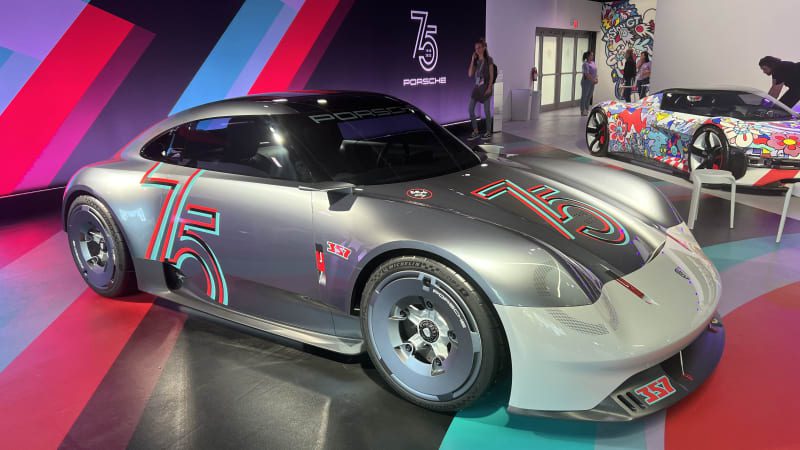Porsche Vision 357 visits SXSW to celebrate 75 years since the very first Porsche

AUSTIN, Texas — The Porsche 356 is the vehicle that started it all for the storied sportscar brand almost 75 years ago. On June 8, 1948, the 356/1 Roadster, powered by a 1.1-liter air-cooled flat-four engine from Volkswagen, was road-certified and became the first car to bear the Porsche marque. It would evolve into the celebrated 356 Speedster of the mid-1950s – whose classic design makes it one of the most sought-after collector cars ever – and later give rise to the venerable Porsche 911, introduced as a replacement for 356 in 1963 and that continues production today.
To celebrate the legacy of the 356, at the recent SXSW conference in Austin, Texas, Porsche displayed its 75th anniversary concept called the Vision 357. We were on hand when the concept’s chief designer, Ingo Scheinhütte, gave a deep dive into the look of Vision 357 during a presentation called “75 Years of Porsche: The Evolution of the 356” at the Porsche House at SXSW.
The Vision 357 pays homage to the pater familias Porsche in its bulbous but flowing form and via styling cues such as round (but hidden) headlights and a rear grille that mirror design elements of the 356. Black A-pillars that cause the windshield to visually tie into the side windows are a nod to the original Porsche’s distinctive split windscreen, while the greyscale paint is a vestige of the 1950s-era 356. Even the bulky wheels are meant to mimic those of the first 356s, although the concept’s one-off body is covered with somewhat garishly modern graphics and underneath is the thoroughly contemporary performance platform of the Cayman GT4 RS.
While it’s meant to celebrate the past, Scheinhütte said the Vision 357 points to the potential future design language for Porsche. “As much as we did it for the 75th birthday of the 365, we also did it as a platform to experiment, try out different things and see if it really works.”
Probably the most radical aspect of the Vision 357 – but one that also links back to the primordial Porsche – are the headlights hidden behind perforations. “We had the 356 in mind and its very distinctly shaped headlights,” Scheinhütte said. “But we didn’t want to cut into the front fender.”
The idea is to have a similarly shaped perforated surface that light can shine through but that can be painted to better blend into the car. “You have the personality and style of the 365 headlights but also the beautiful front fender,” Scheinhütte said. “We wanted something very clean, so we came with that idea that maybe, probably, should develop one day.”
Scheinhütte said that 10 years ago, such a bold design statement would not have been possible at Porsche. “Because we thought the car needed this round cutaway in the front fender to make it Porsche,” he added. “Now we know it can very much look like Porches without that.”
Scheinhütte said that the Vision 357’s balance between the past and the future is emblematic of Porsche’s prudent, incremental approach to design. “If you have a brand like Porsche with such a strong history, on one hand you don’t want to change anything, especially if you’re a fan of the company and like the look of the cars and think they’re beautiful.”
As for how much of the look of the Vision 357 will translate into future production vehicles, Scheinhütte said, “We’re always thinking about the near horizon for most of the things we do.” But he added that vice president of style for Porsche Mike Mauer – who recently said of the Vision 357’s design that “the brand history serves as a source of inspiration” – of course has final say.
“At the end of the day, he will say, ‘I like this shape and this is the direction we should go,’” Scheinhütte said.



